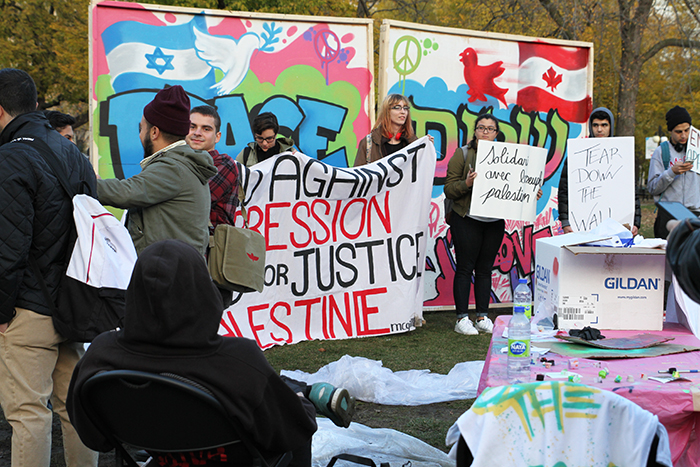On Nov. 8, Chabad at McGill, the local branch of Chabad International, hosted an event on Lower Field that soon attracted protesters, including members and supporters of the Boycott, Divestment, and Sanctions (BDS) campaign. Chabad International is a not-for-profit educational outreach organization that aims to create a “home-away-from-home”. The BDS Action Network at McGill lobbies to divest from and prevent any future university investments in companies that profit from the occupation of Palestine, as well as for Students’ Society of McGill University (SSMU) to take a firm stance condemning Israeli actions. As part of the event, which was called Artists 4 Israel, Chabad McGill erected a section of wall on which participants could paint murals.
According to Eva Chorna, a U1 Science student and member of Chabad’s student board, the event was intended to promote positive messages.
"Basically, what we tried doing with this event [was] we brought a group of artists [who] came to spray paint a mural on which we were promoting a really peaceful and inclusive message for coexistence," Chorna said.
According to Chorna, the event was designed to bring together people of different backgrounds and political views through a common medium–art. The event was not related to Israeli-Palestinian relations.
"It’s just related to the idea that […] Israel comes to campus with its arms wide open, with the desire to have a conversation about peace, with the desire to engage with students in a meaningful dialogue, in a meaningful conversation," Chorna said.
Protesters felt that the wall on which the murals were painted inappropriately resembled the West Bank Barrier Wall, an obstruction built by Israeli forces in 2002 to separate Palestine and Israel. According to Laura Khoury, U3 Engineering and a BDS supporter who was present at the protest, the event made many students uncomfortable because of its likeness to the West Bank Barrier.
"It is […] frustrating that they used a form of appropriation [such] as the Wall, which for a lot of people is […] triggering because many Palestinians need to go through multiple checkpoints on this wall to even go to school," Khoury said.
Julie Skarha, U3 Arts and Science, a protester who is an organizing member of McGill BDS Action Network, indicated that she found the symbolism of the wall a matter of concern.
"The graffiti canvas normalized the occupation by appropriating forms [of] Palestinian resistance in the West Bank against the Apartheid Wall, [which] restricts the mobility, access to medical resources, and water supplies of Palestinians in the West Bank," Skarha said.
According to Chorna, once the protesters stood in front of the murals, she and other participants invited them to partake in spray-painting the mural and were firmly rejected by the pro-Palestinian.
"These guys decided that instead of contributing […] and maybe even tagging their own message […] to not interact with us, refused to speak to us, [stood] in front of our mural, [and blocked] the view of other students from this amazing, artistic work, and [created] tensions," said Chorna.
According to Khoury, the event sent an uncomfortable message to Palestinian students on campus.
"Forgetting the political sphere in which we [live] and in which the continuous colonization of Palestine actually exists and promoting Israel as a country [and] culture of peace beyond the political spectrum is not in any way fair […],” said Khoury. “It does not portray the actual situation on the ground and for us Palestinians that [walk] by on this campus, we feel very uncomfortable to see the appropriation of Palestinian resistance."
A previous version of this article incorrectly stated that the BDS Action Network at McGill lobbies to prevent university investments in Israeli companies that profit from the occupation of Palestine. In fact, the BDS Action Network at McGill does not exclusively focus on Israeli companies. Further, the Action Network lobbies for the university to divest from current investments as well as to prevent additional investments that contribute to the occupation of Palestine. The Tribune regrets this error.









These idiot protesters have never been to Israel and have no clue of what’s going on there.
“A previous version of this article incorrectly stated that the BDS Action Network at McGill lobbies to prevent university investments in Israeli companies that profit from the occupation of Palestine. In fact, the BDS Action Network at McGill does not exclusively focus on Israeli companies. Further, the Action Network lobbies for the university to divest from current investments as well as to prevent additional investments that contribute to the occupation of Palestine. The Tribune regrets this error.”
Incorrect. Directly from their website’s “About us” section:
What is McGill BDS?
The McGill BDS Action Network is the result of a growing concern among McGill students about the university’s complicity in the Israeli occupation of Palestine and the ongoing violations of Palestinian human rights. This support is given both through McGill’s investments in companies that profit from the occupation as well as ties with universities that are complicit in war crimes committed by Israel.
We are a grassroots campaign led by McGill students to answer the call from Palestinian civil society in 2005 for Boycott, Divestment, and Sanctions against Israel until it “meets its obligation to recognize the Palestinian people’s inalienable right to self-determination and fully complies with the precepts of international law by:
1. Ending its occupation and colonization of all Arab lands captured in 1967 and dismantling the Wall,
2. Recognizing the fundamental rights of the Arab-Palestinian citizens of Israel to full equality,
3. Respecting, protecting and promoting the rights of Palestinian refugees to return to their homes and properties as stipulated in UN resolution 194.”